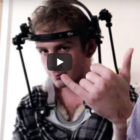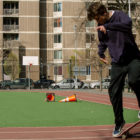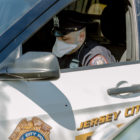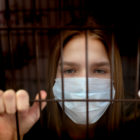
Imprisoned on Drug Charges, Woman Seeks COVID Clemency
|
Sandra Lawson was only months away from graduating high school when she found out her grandfather had died.
Juvenile Justice Information Exchange (https://jjie.org/tag/coronavirus/page/6/)

Sandra Lawson was only months away from graduating high school when she found out her grandfather had died.

When coronavirus blazed through Neuse Correctional Institution in Goldsboro, N.C., in mid-April, the North Carolina Department of Public Safety (DPS) tested everyone. At last count, the prison had 467 positive cases out of 701 men tested.

Just like teenagers across Alabama and the nation, Frazier is trying to finish a school year without the grounding of his usual routine — in the middle of a global public health crisis. While it’s rare for young people to have life-threatening reactions to coronavirus, that doesn’t mean they aren’t struggling through the disruptions in daily life. Being away from the routine and safety of school, extracurriculars, work and friends can be dangerous for young people’s mental and physical well-being.

This time of year usually marks year-end celebrations and summer preparations for youth. But with regular traditions like prom and graduation on hold, and with many jobs in limbo, teenagers in Alabama aren’t sure what to expect for the coming months.

As coronavirus continues to disrupt daily life, anti-gun violence advocates worry the communities hit hardest will see spikes in shootings.

First, it was just a headache. A migraine burrowing into his forehead, one that heated and cooled his body, made the room spin a little. But he didn’t usually have migraines. The dizziness and the onset of nausea felt wrong. Like they could be something more. On the outer edges of New York City, as the sound of sirens had started to become more frequent, a troubling thought came to his mind.

As one of the first states to confront the ghastly reality of the COVID-19 pandemic, New Jersey prepared for what many saw as inevitable: an outbreak in its jails and prisons.

E had called to give a heads up.
“I may not be in contact for a few weeks,” he said. The Pennsylvania Department of Corrections (DOC) was transferring people from his prison, SCI Rockview in Bellefonte, Pa., to other prisons throughout the state.

The public won’t know their names, their ages nor why they were behind bars. They won’t hear their interaction with the person whose job is to check them for symptoms weekly. Nor will they hear the thoughts running through their minds as they sit in their cell, isolated from the unprecedented chaos outside.

From Louisiana to New York, juvenile detention centers are reporting more staff and children testing positive for COVID-19. Incarcerated youth are extremely vulnerable to infection. We know these numbers will only continue to get worse unless youth justice systems act immediately. Releasing youth from locked facilities where social distancing is impossible or avoiding sending them there in the first place is critical. This is why even those of us who have experience running such facilities are calling for action.